
Publisher:
Bonnie King
CONTACT:
Newsroom@Salem-news.com
Advertising:
Adsales@Salem-news.com

~Truth~
~Justice~
~Peace~
TJP
Jul-06-2010 17:09

 TweetFollow @OregonNews
TweetFollow @OregonNews
Canada in the Twenty-First Century
Daniel Johnson Salem-News.comDaniel Johnson's critical analysis of Canada - as his home country celebrates 143 years.
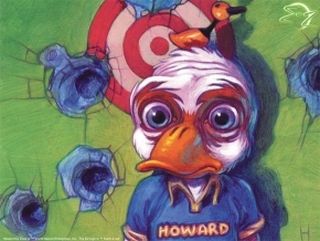 Artwork from: Syncrude Canada's Toxic Mistake |
(CALGARY, Alberta) - For those of you who think I’m only critical of the U.S., here is an unabridged piece I published in Calgary’s FFWD Weekly newspaper on July 1, Canada Day.
“After feeling for more than a century that being Canadian was a journey rather than a destination,” says Peter C. Newman, former editor of Maclean’s, Canada’s newsweekly magazine, “we have arrived at last. We have attained a state of delicious grace which allows us to appreciate that what’s important is not so much who we are but that we are—that sometimes a large nation can become a great one.” We are”, he concludes, “a lucky people inhabiting a wonderful hunk of geography.”
On July 1 we celebrated Canada—143 years as a nation. Through those fourteen decades (put that way, it doesn’t sound all that long), much has changed—both inside and outside our borders.
Throughout our history we have always had stable governance. We have super-abundant natural resources, fresh water, food sources and land. On the Human Development Index (a standard measure of well-being, especially child welfare, covering life expectancy, literacy, education and standards of living) Canada is fourth, after Norway, Australia and Iceland.
Yet, Canadians suffer a cultural complex—a combination of insecurity and inferiority. In his book The Canadians, New York Timeswriter Andrew Malcolm said: “The only way to get a Canadian to praise his or her country it to announce you are an American, and then criticize Canada unmercifully. Sometimes even that wouldn’t do it.”
Provided you’re not an aboriginal person, Canadians live in one of the most blessed lands on earth. But we can’t be too sanguine about our position in the world. There are challenges.
Our environmental record is shameful; our treatment, both past and present, of our native peoples is beyond shameful; we have a national police force, the RCMP, bungling high profile cases; we continue to throw away lives and money in Afghanistan.
Environmental failure
Canada ranks 15th out of 17 peer countries scoring a “C” on its environmental performance report card, says the Conference Board of Canada. “Canada’s poor record in several areas—including climate change, smog, and waste generation—drags down its comparative performance.” Only Australia and the U.S. rank lower.
Although we have abundant fresh water, our water usage is more than double that of the sixteen country average. “Canada uses more than nine times the amount of water per capita than the U.K., which has scored an ‘A.’ Only the U.S. ranks behind Canada on this indicator,” says the Board.
Nick Burman, President of Alberta's Vision 2012 Association, says that Canada is rapidly losing status in the world’s eyes in terms of environmental stewardship. Even the U.S. is doing better than we are, especially California.
“Why is Canada handling the environment so poorly that other nations are starting to condemn us?” Burman asks. “ Canada is handling the environment poorly because our political system is breaking down. The current party electoral system has become so confrontational that everything is politicized.”
“The environment is something we cannot afford to politicize. As it now, most of our members of parliament talk a good line about the environment, yet since the signing of the Kyoto Accord nothing really substantive has happened.”
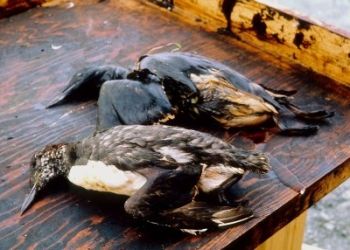 Some of the dead ducks recovered in the Syncrude incident |
Syncrude Canada was found guilty last week of environmental charges in the deaths of 1,606 ducks found in a 12-square-kilometre tailings pond, of the Alberta oilsands which contained toxic, oily bitumen effluent. It happened because Syncrude deployed its bird deterrence systems weeks late and had cut back on the seasonal staff. Greenpeace and opposition parties are framing this as a failure of the Alberta government which they say cut its monitoring budget and let the industry regulate itself.
It seems to be part of an industry attitude. On June 23, 55 year old Allan Kruse of Foley, Alabama, who was contracted as an oil spotter for BP, killed himself in the wheelhouse of his boat. "Nothing was easy working with BP. Everything was hard, and it consumed him. He wasn't crazy," said his wife later. From the beginning, Kruse was unhappy with the glacially slow process of working for BP. He was overwhelmed with the paperwork to get an assignment and get paid. In particular, one invoice required 52 pages to fill out, and then there were problems actually getting the paperwork to BP, his wife said.
In the 1970s, former Venezuelan Oil Minister and OPEC co-founder Juan Pablo Perez Alfonzo called oil “the devil’s excrement,” and predicted, “Ten years from now, 20 years from now, you will see: oil will bring us ruin.” The Gulf oil disaster and the oil sands tailings pond attracting unsuspecting ducks to their deaths, are only two harbingers of our environmental future.
How did we get here?
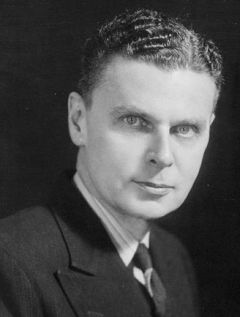 Canada's former PM John Diefenbaker |
Although John Diefenbaker was the most flamboyant of our recent prime ministers (1957-63) and he had the largest parliamentary majority in Canadian history, it was Lester B. Pearson (1963-68) who had the most profound impact on what Canada is today. Pearson repeatedly resisted U.S. President Lyndon Johnson’s demands for Canada to send combat troops to Vietnam. In his two terms in office, (both with minority governments), he introduced universal health care, student loans and the Canada Pension Plan. And, he replaced the British-themed flag with today’s Maple Leaf flag.
Vilified in Alberta for the National Energy Program, Liberal Pierre Trudeau repatriated our Constitution from Great Britain and passed the Charter of Rights and Freedoms (he was also the only PM to ever institute the War Measures Act). Conservative Brian Mulroney is infamous for NAFTA which continues to put Canada’s sovereignty in danger. Maude Barlow, the Chair of the Council of Canadians says that American corporate challenges to Canada under NAFTA rules threaten Canadian sovereignty. “The Harper government should abrogate this flawed deal once and for all." This is not likely to happen as towards the end of the Bush presidency, Stephen Harper took to parroting Bush by ending his speeches with “God Bless Canada.”
Politically, the country has clearly gone downhill in the last 50 years. More recently, Harper has polarized much of the electorate which is why he cannot gain a majority. No matter how poorly the Liberals do, his party’s approval do not move out of the 30s. His broken promises are legion, the most egregious being fixed election dates, which he ignores for his own political purposes and an elected Senate, which he then proceeded to pack with conservative partisans.
With Harper pushing tough-on-crime legislation, Don Head, commissioner of Correctional Service of Canada, says “we’ve carefully examined this legislation and expect that, as a result, we will receive an increased number of approximately 3,400 offenders over the next three years.”
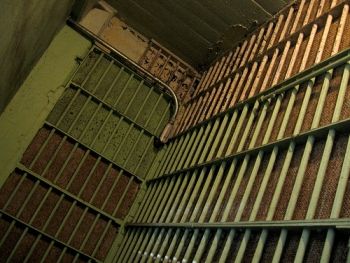
Those numbers are not keeping in step with the Supreme Court of Canada which, in a 1999 judgment, condemned prison as failing society, pointing out that prison does little to deter crime, is extremely costly, and, in fact, may make ex-prisoners a greater danger to society.
"In recent years, sentences of imprisonment in Canada have increased at an alarming rate," the Supreme Court said. "If over-reliance on incarceration is a problem with the general population, it is of much greater concern in the sentencing of aboriginal Canadians."
A horrendous number of natives are sitting in Canada’s prisons.
The crime against the Native peoples of Canada
Although only 4% of the population, aboriginals make up 19.6% of prison populations and 13.6% of those on parole says Michelle Mann, a Toronto lawyer dedicated to legal and policy matters relating to Aboriginal issues. She goes on to say that “for women, this over-representation is even more dramatic—33.1% of women in federal penitentiaries were Aboriginal.”
In the prisons themselves, the skew is greater. According to Corrections Service Canada, in May 2009, there were 431 aboriginals in maximum security compared to 1,997 non-aboriginal—more than five times greater in proportion. Aboriginal offenders are less likely to be granted parole and likely to serve more or all of their sentence before receiving parole. The greater likelihood of statutory release for Aboriginal offenders means more time spent incarcerated and less time in the community under supervision for programming/intervention than for non-Aboriginal offenders.
Outside prison, natives don’t fare much better. “It is a black mark on Canada because we are one of the richest countries in the world yet have Third World living conditions right in our back yard,” says out Phil Fontaine, past National Chief of the Assembly of First Nations.
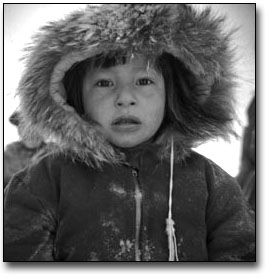 Canadian Aboriginal child: archives.gov.on.ca |
- One aboriginal child in eight is disabled, double the rate of all Canadian children
- Among First Nations children, 43 per cent lack basic dental care.
- Overcrowding among First Nations’ families is double the rate of that for non-native families.
- Mould contaminates almost half of all First Nations households.
- Almost half of aboriginal children under 15 years old residing in urban areas live with a single parent.
- Approximately 100 First Nations communities must boil their drinking water.
- Some 40 per cent of Aboriginal children off of reserves live in poverty.
- The suicide rate among native youth is five to six times higher than the Canadian average.
One of the worst national policies of the Indian Act, was the residential school system, set up to aggressively assimilate the native peoples into European-Canadian society. There were about 130 such schools in Canada, and when children were forcibly separated from families, they suffered sexual and physical abuse (including torture) at the hands of their church caregivers. In 2008, the government apologized for the schools’ policy and set up a $1.9-billion compensation plan for victims.
Canada is not alone in this humanitarian disgrace. It’s as bad or worse in Australia where Aboriginal people (2.3% of the total population), made up 14% of Australia's prison population in 2008.
There is no easy or simple solution. The issues behind this exist within the entire lack of cultural context under which natives labour. Not having lived and grown up in the kind of social world that non-aboriginals take for granted, it is completely unreasonable to expect them to be like us. They are culturally different and it is no surprise that they too often run afoul of white cultural norms. You see them shuffling down the street—alone and afraid in a world they never made.
Canada’s military adventures
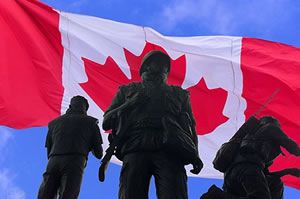
Until recently, Canada has been widely recognized on the world stage as a peacekeeping nation par excellence. Canada took part in the very first UN peacekeeping in Egypt during the 1956 Suez crisis. The UN needs Canada as a peacekeeper now more than ever but, says Ottawa’s Rideau Institute, “The Afghanistan campaign has not only been extremely expensive, it has essentially abandoned Canada’s 50-year commitment to UN peacekeeping. While low levels of peacekeeping spending may continue for some time, the reorientation of the Canadian military is clear. For all intents and purposes, DND [Department of National Defence] spending on peacekeeping missions has stopped.”
Canada is in the quagmire of Afghanistan, in large part, to appease the U.S. because we declined to partake in the Iraq war. Our losses in Afghanistan are greater than those of any other country. Canada had 14.4 dead per 1,000 soldiers compared to the U.K. at 9.8, NATO at 5.0 and the U.S. at 4.5. The numbers are even worse than the Soviets’ losses (12.5 per 1,000) when they were there in the 1980s.
Last month, opposition to our being in Afghanistan reached its highest level ever—59%. Here the Harper government has polarized Canadians. Among conservative voters 56% are in favour of Canada fighting there. Opposed, however, are Liberals 60%, NDP 64%, Greens 78% and Bloc (Quebec separatist party) 86%.
Afghanistan is not called the graveyard of empires for nothing. The war is costing us $214 million/month with an estimated total cost of $28.4 billion by the end of 2011. Incredibly, Parliament has voted to extend Canada’s mission beyond that. No one is recognizing that this is all wasted money. There is not and cannot be any kind of “peace” that Western nations would recognize.
Khalil Nouri, is a cofounder of New World Strategies Coalition Inc., an Afghan think tank for non-military solution studies in Afghanistan. The West, he says, “is caught in a 'Tribal Civil War' propped up by Karzai et al. If there is no shift away from the paradigm of Muslim radicalism, certainly a re-emergence of the old bitter civil war between the two powerful Pashtun tribal groups—“Durranis” and “Ghelzais”—that was fought over three centuries ago, will explode upon us today.”
Canada, and the rest of the West are in a no-win war. Time to move on.
The RCMP is broken and should be disbanded
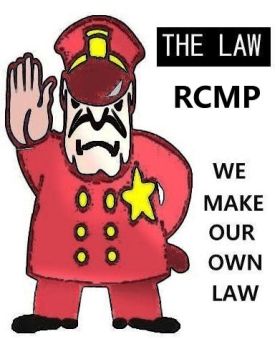
The American approach to its native population was war—an attempt to simply kill them all. The British (Canadian) approach was to herd them into the equivalent of concentration camps (reserves) and deal peacefully with them in the northwest territories (the prairie provinces) with a special police force, the Royal Northwest Mounted Police.
For a century (they became the RCMP in 1920), their reputation was unsurpassed until they bungled the Air India bombing of 1985 (the largest mass murder in Canadian history); gave false information to American authorities, sending Mahar Arar, an innocent man to Syria to be tortured in 2002 and, in 2007, tasered a helpless immigrant, Robert Dziekanski, to death—then stonewalled and lied about it.
In the Dziekanski case, four trained mounties were needed to subdue a passive Dziekanski (armed with an office stapler which he held in his hand, clearly just fidgeting), including using a knee on his neck to hold him down. Dziekanski’s last recorded words (in Polish) were, “Why?” An undisclosed financial settlement was recently made with his mother.
Arar was flying home from Tunis, and was detained during a layover at John F. Kennedy International Airport in September 2002 after the RCMP had improperly given information to US authorities resulting in Arar, a Canadian citizen, being secretly flown to Syria where he was imprisoned for 10 months and tortured into signing a false confession of having links to terrorists.
The day before he resigned on December 7, 2006, RCMP Commissioner Giuliano Zaccardelli apologized to Arar. At the same time he informed the House of Commons Standing Committee on Public Safety and National Security that his earlier testimony about the Arar case was “inaccurate”. The Canadian government settled with Arar at a cost to the taxpayer of $10 million.
The paradox of cultural integration
Canada, like most developed nations, is not a fixed entity. It is and always will be, ever-changing—a work in progress. With every new arrival, the country is changed in some small way. But when a large number of immigrants arrive from one country, culture, or religion, the entire nation is changed and affected—not always to the good.
As of 2004, Canada had the highest per capita rate of immigration of all developed countries with immigration as high as 262,000 in one year (fewer than 5,000 from the U.S.)
Americans see their society as a melting pot of immigrants, whereas Canada is more a cultural mosaic of biculturalism which encourages immigrants to maintain their cultural ties. “As a result,” says Statistics Canada, “the number of visible minorities in Canada is growing. And, Canadians listed more than 200 ethnic groups in answering the 2001 Census question on ethnic ancestry, reflecting a varied, rich cultural mosaic as the nation started the new millennium.”
One outcome is the ghettoization of Jamaicans in Toronto’s Jane-and-Finch area, resulting in drug and weapons wars that are still largely out of control, but with the Jamaican community itself working proactively to correct the problem, there is hope that these immigrants will, over time, become part of a culture that we call Canada.
Extremist Sikhs from India have brought their old country disputes to Canada which resulted, most publicly, in the Air India bombing of 1985. In an apology to the survivors of the 329 killed—25 years later—Stephen Harper said that politicians of all stripes must “carefully and systematically marginalize those extremists who seek to import the battles of India’s past.”
 16 year-old Aqsa Parvez |
The most distorting of immigrants are those Muslims who do not want to become Canadians but, instead, want Canada to adapt to their old ways. The recent unsuccessful attempt to introduce Sharia (God’s) law in Ontario by some Muslim extremists attests to that.
What bothers many Canadians is the Muslim misogynist treatment of women. It’s not uncommon, right here in Calgary, to see a Muslim couple on the street—she in traditional Muslim attire, partially or completely veiled—and the husband wearing Nike sneakers, jeans and a T-shirt promoting some local sports team.
Most tragic within this cultural throwback are the “honour” killings. In December 2007, 16 year-old Aqsa Parvez was murdered by her father and brother for “embarrassing” the family by attempting to adapt to Canadian culture. She was seeking a part time job and, two days before she was killed, went to a movie for the first time. The two men were recently sentenced to life in prison.
In June 2009, a submerged car was found in the Rideau Canal Locks outside Montreal that contained the bodies of three teenage sisters and the body of their father's first wife. The girls’ parents and an older brother are now on trial for murdering these four women.
Looking ahead
What lies ahead for Canada? Just over a century ago Prime Minister Sir Wilfred Laurier predicted that “the Twentieth Century belongs to Canada.”
Since Confederation foreign controlled corporations have taken control of much of our land and resources. The Foreign Investment Review Agency was formed by Prime Minister Trudeau in 1973 to counter criticism that foreign business domination was harmful to Canada. After his election in 1984, the Mulroney government dismantled FIRA.
Foreign business control as a threat to Canadian sovereignty is of greater concern than ever. Just in the last decade or so we have lost as Canadian entities:
- 2005 Molson Breweries, one of the oldest companies in Canada merged with Coors
- 2006 Dofasco, Canada's largest steel maker acquired by Luxembourg-based Arcelor
- 2006 Hudson's Bay Company, Canada's largest retailer, and North America's oldest corporation (est. 1670), sold to U.S. investor Jerry Zucker
Business effects are economic, but Canadian culture exists almost as a wraith. Baby boomers grew up with Disneyland, the Mouseketeers and American Westerns. Their children grew up with Sesame Street and American action movies. Americans tend to see Canada as a branch plant extension of the U.S. economy.
If Canada is to survive the 21st century as an independent nation, we must find ways to become masters in our own house in a globalized neighbourhood. It’s going to be a ongoing challenge for our children and grandchildren.
============================================
 Daniel Johnson was born near the midpoint of the twentieth century in Calgary, Alberta. In his teens he knew he was going to be a writer, which is why he was one of only a handful of boys in his high school typing class — a skill he knew was going to be necessary. He defines himself as a social reformer, not a left winger, the latter being an ideological label which, he says, is why he is not an ideologue. From 1975 to 1981 he was reporter, photographer, then editor of the weekly Airdrie Echo. For more than ten years after that he worked with Peter C. Newman, Canada’s top business writer (notably on a series of books, The Canadian Establishment). Through this period Daniel also did some national radio and TV broadcasting. He gave up journalism in the early 1980s because he had no interest in being a hack writer for the mainstream media and became a software developer and programmer. He retired from computers last year and is now back to doing what he loves — writing and trying to make the world a better place
Daniel Johnson was born near the midpoint of the twentieth century in Calgary, Alberta. In his teens he knew he was going to be a writer, which is why he was one of only a handful of boys in his high school typing class — a skill he knew was going to be necessary. He defines himself as a social reformer, not a left winger, the latter being an ideological label which, he says, is why he is not an ideologue. From 1975 to 1981 he was reporter, photographer, then editor of the weekly Airdrie Echo. For more than ten years after that he worked with Peter C. Newman, Canada’s top business writer (notably on a series of books, The Canadian Establishment). Through this period Daniel also did some national radio and TV broadcasting. He gave up journalism in the early 1980s because he had no interest in being a hack writer for the mainstream media and became a software developer and programmer. He retired from computers last year and is now back to doing what he loves — writing and trying to make the world a better place
Articles for July 5, 2010 | Articles for July 6, 2010 | Articles for July 7, 2010

Quick Links
DINING
Willamette UniversityGoudy Commons Cafe
Dine on the Queen
Willamette Queen Sternwheeler
MUST SEE SALEM
Oregon Capitol ToursCapitol History Gateway
Willamette River Ride
Willamette Queen Sternwheeler
Historic Home Tours:
Deepwood Museum
The Bush House
Gaiety Hollow Garden
AUCTIONS - APPRAISALS
Auction Masters & AppraisalsCONSTRUCTION SERVICES
Roofing and ContractingSheridan, Ore.
ONLINE SHOPPING
Special Occasion DressesAdvertise with Salem-News
Contact:AdSales@Salem-News.com

Salem-News.com:
googlec507860f6901db00.html

Terms of Service | Privacy Policy

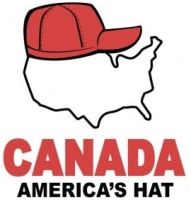
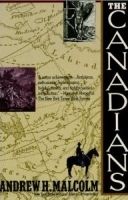
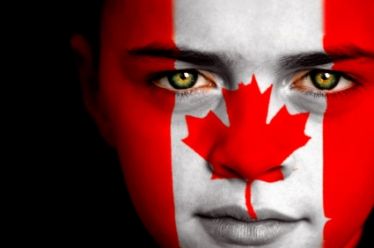
All comments and messages are approved by people and self promotional links or unacceptable comments are denied.
Hank Ruark July 28, 2010 8:23 pm (Pacific time)
Friend JT: No rational, reasonable U.S. person, even the most crusty Yankee or plantation-attitude Southerner, denies our major problems, mostly minor wounds self-inflicted by rapid social growth providing widespread opportunity for millions. What we find hard to swallow is outlander comment on what must remain an unknown future, with negativistic neoclassic current/eventism twisted as if trusty for that task. But, all in all, we welcome insights from any well-meaning source and if we suffer NOT in silence it ain't declaration of war across that peaceful border, in lands we all love. Those who visit for closer view usually volunteer what their own eyes has verified --somewhat less bitterized and in most ways at least a bit brighter than brought into view recently here. No reliable reports yet, I find, for Christ leaving that cross...
Hank Ruark July 28, 2010 8:22 pm (Pacific time)
Friend JT: No rational, reasonable U.S. person, even the most crusty Yankee or plantation-attitude Southerner, denies our major problems, mostly minor wounds self-inflicted by rapid social growth providing widespread opportunity for millions. What we find hard to swallow is outlander comment on what must remain an unknown future, with negativistic neoclassic current/eventism twisted as if trusty for that task. But, all in all, we welcome insights from any well-meaning source and if we suffer NOT in silence it ain't declaration of war across that peaceful border, in lands we all love. Those who visit for closer view usually volunteer what their own eyes has verified --somewhat less bitterized and in most ways at least a bit brighter than brought into view recently here. No reliable reports yet, I find, for Christ leaving that cross...
JT July 10, 2010 7:46 am (Pacific time)
Funny how your critical articles on the USA cause a flurry of comments trying to deny the problems Americans face...and this article pointing out Canada's flaws has been quiet, because us Canadians read it and sit back with a beer, look out into the forest (or the vast grasslands of the prairies), nod our heads in agreement and promise ourselves to vote differently in the next election :)
[Return to Top]©2025 Salem-News.com. All opinions expressed in this article are those of the author and do not necessarily reflect those of Salem-News.com.